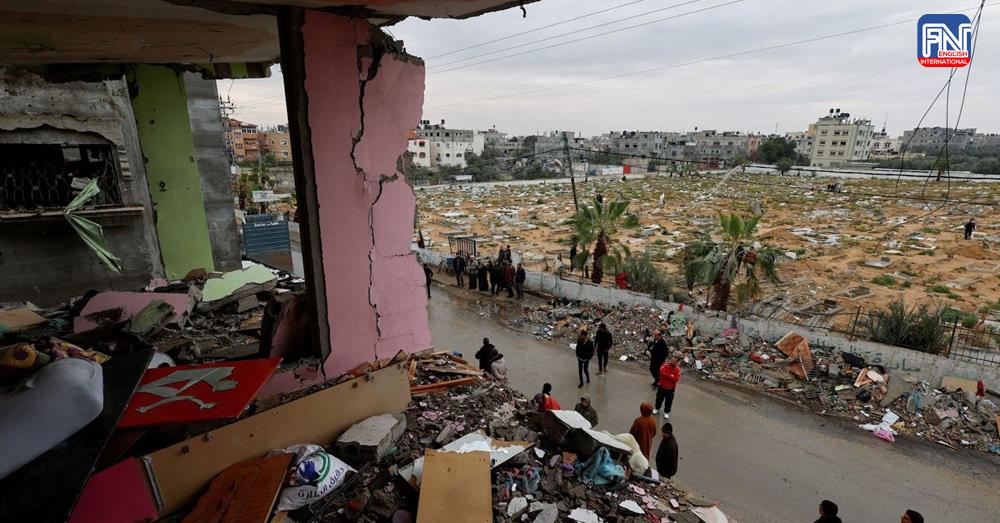RAFAH, Mar. 19 (Reuters) - Israeli Prime Minister Benjamin Netanyahu spurned a plea from Joe Biden to call off a planned ground assault of Rafah, the last refuge in Gaza for more than a million displaced people, where Israel believes Hamas militants are holed up.
Netanyahu told lawmakers on Tuesday he had made it "supremely clear" to the U.S. president "that we are determined to complete the elimination of these battalions in Rafah, and there's no way to do that except by going in on the ground".
The two leaders spoke by phone on Monday. White House National Security Adviser Jake Sullivan said Washington believed that storming Rafah would be a "mistake" and that Israel could achieve its military aims by other means.
U.S. and Israeli officials will likely meet early next week in Washington to discuss Israel's military operation in Rafah, White House spokesperson Karine Jean-Pierre said on Tuesday, citing deep concern about reports of imminent famine in Gaza.
Jean-Pierre said Biden had asked Netanyahu to send a senior team of military, intelligence and humanitarian officials to Washington for comprehensive discussions in the coming days.
Washington has launched a new diplomatic push for a ceasefire in the nearly six-month-old war to free hostages and bring in food aid to ward off famine in the Palestinian enclave.
Secretary of State Antony Blinken announced a trip to the Middle East in which he would meet senior leaders of Egypt and Saudi Arabia to "discuss the right architecture for a lasting peace". Unusually, Blinken made no mention of a stop in Israel itself, and the Israeli foreign ministry said it had received no notification to prepare for one.
Late on Tuesday, an Israeli airstrike on a major roundabout killed 30 people from groups that local clans had formed to secure the entry of aid trucks into Gaza City, Hamas media said. Hamas denounced the strike on groups protecting aid trucks as an effort to "spread chaos and security anarchy."
At the Nuseirat refugee camp in central Gaza, an Israeli airstrike targeting a residential building with three floors killed at least 15 people, with some believed to be trapped under its rubble, Palestinian health officials said.
The Israel Defence Forces did not immediately respond to a request for comment on the airstrikes.
In Rafah, dazed survivors walked through the ruins of a home on Tuesday morning, one of several buildings hit in overnight Israeli airstrikes that killed 14 people in the city, where more than half of Gaza's 2.3 million people have been pushed up against the southern border fence with Egypt.
At a nearby hospital morgue, relatives wailed beside corpses laid out on the cobbles. A woman peeled back a tiny bloodstained shroud to reveal the face of a small boy, rocking him back and forth in her arms.
"There’s U.S. support, European support and support of the whole world for Israel, they support them with weapons and planes," said one mourner, Ibrahim Hasouna. "They mock us and send four or five airdrops (of aid) just to save their faces."
The war was triggered when Hamas fighters crossed into Israel on a rampage on Oct. 7, killing 1,200 people and capturing 253 hostages, according to Israeli tallies.
Nearly 32,000 people have been confirmed killed in Israel's retaliatory onslaught, according to Palestinian health officials, with thousands more feared lost under the rubble.
The international hunger monitor IPC, relied on by the United Nations, said on Monday Gaza's food shortages had already far surpassed famine levels, and Gazans would soon be dying of hunger at famine-scale rates without a ceasefire.
Israel, which initially let in aid only via two checkpoints on Gaza's southern edge, denies blame for hunger in the enclave and says it is already opening new routes by land, sea and air.
It says the U.N. and other aid agencies should do more to bring in food and distribute it. The U.N. says that is impossible without better access and security, both of which it says are Israel's responsibility.
"The extent of Israel's continued restrictions on entry of aid into Gaza, together with the manner in which it continues to conduct hostilities, may amount to the use of starvation as a method of war, which is a war crime," said U.N. Human Rights Office spokesperson Jeremy Laurence.

Photo from Reuters